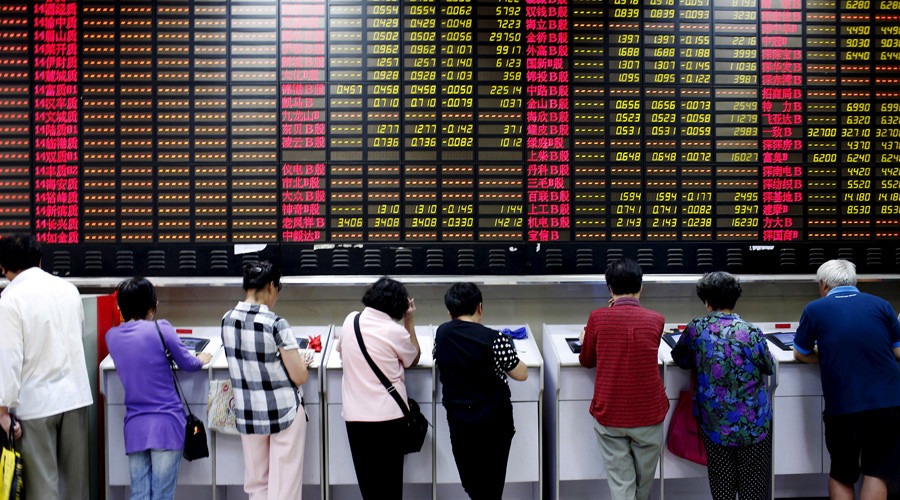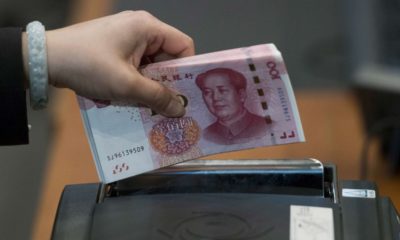China said it cracked the nation’s biggest “underground bank,” which handled 410 billion yuan ($64 billion) of illegal foreign-exchange transactions, as the authorities try to combat corruption and rein in capital outflows that have hit records this year.
More than 370 people have been arrested or face lawsuits or other punishment in the case centered in eastern Zhejiang province, the official People’s Daily reported on Friday, citing police officials. The case brought the total for underground banking and money-laundering activities to 800 billion yuan since April, the newspaper said.
The probe began in September last year and the police took almost a year to sort through more than 1.3 million suspicious transactions, the state-run Xinhua News Agency reported separately. The authorities froze more than 3,000 bank accounts, Xinhua said.
Global Flows
The case highlights the nation’s struggle to control capital outflows that have helped to send real-estate prices soaring from Vancouver to Sydney — even when Chinese citizens are officially limited to converting $50,000 of yuan per year. Some people may be moving the proceeds of corruption, while others may be concerned about the outlook for the economy and the potential for the yuan to weaken.
“The government wants to stem outflows and stabilize the yuan’s exchange rate, but the outflows cannot be stopped unless people change their expectation on yuan depreciation,” said Xi Junyang, a finance professor at Shanghai University of Finance & Economics. Besides illegal banking operations, “a lot of money is leaving the country by legal means,” Xi said.
China’s capital outflows may have climbed to a record $194 billion in September before cooling to $62 billion in October, according to a Bloomberg gauge which also takes into account decisions by exporters and direct investment recipients to hold funds in dollars.
‘Smurfing’
The tactics used by Chinese citizens to defeat the controls include so-called smurfing, where large sums are moved by breaking them down into a series of smaller transfers using the bank accounts and foreign-exchange quotas of a range of individuals.
In the Zhejiang case, a suspect identified as Zhao Mouyi used a different method, setting up more than 10 companies in Hong Kong from 2013 and transferring more than 100 billion yuan through so-called non-resident accounts, which are used by offshore companies in China when they are transferring money abroad, according to the newspaper’s report.
Taking advantage of a “loophole” relating to non-resident accounts — which has since been filled by banks — Zhao circumvented the capital controls by directly transferring yuan overseas and then exchanged the money into foreign currencies at banks including HSBC Holdings Plc in Hong Kong, the People’s Daily said. Zhao then allegedly transferred it to his clients’ accounts, the report said, citing the local police.
Suspicious Transactions
HSBC declined to comment on the report. The Hong Kong Monetary Authority also declined to comment on the specifics of the case, while saying that banks in the city have “stepped up their internal controls to report suspicious transactions.”
- Methods of bypassing China’s currency controls include:
- making transfers using Hong Kong money changers
- carrying checks from underground banks across the border to Hong Kong
- smuggling cash through customs
- making payments abroad using credit or debit cards and then returning merchandise for cash
- getting an overseas mortgage based on savings held within China
The underground banking crackdown is “an attempt to reduce the capital outflow pressure,” said Hou Wei, a banking analyst at Sanford C. Bernstein & Co. in Hong Kong. The government is “determined and very serious” about defending its currency reserves and the exchange rate, the analyst said.
Taiwan, Australia
In another case highlighted by the People’s Daily on Friday, an investigation of an underground bank in Fujian this year uncovered a network spanning Hong Kong, Taiwan, Australia and Saudi Arabia — and a senior executive at a state-owned enterprise who allegedly tried to move 18 million yuan abroad, the newspaper said.
The authorities have made a series of moves to control legal and illegal capital flows, including capping withdrawals at overseas automated teller machines.
The People’s Bank of China has given verbal guidance to onshore lenders to stop offering cross-border financing to offshore banks, people familiar with the matter said this week. The monetary authority has also told overseas banks to halt onshore bond repurchases, two of the people said.
Bloomberg

 Billionaire Watch3 weeks ago
Billionaire Watch3 weeks ago
 Startups4 weeks ago
Startups4 weeks ago
 News4 weeks ago
News4 weeks ago
 News4 weeks ago
News4 weeks ago
 Bitcoin4 weeks ago
Bitcoin4 weeks ago
 Naira4 weeks ago
Naira4 weeks ago
 Forex3 weeks ago
Forex3 weeks ago
 Treasury Bills4 weeks ago
Treasury Bills4 weeks ago























